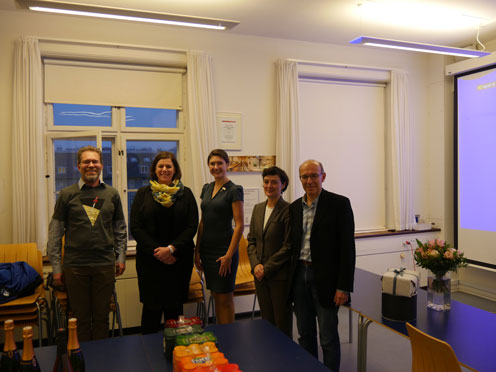Congratulations to Diana Vladimirova

Congratulations to Diana Vladimirova at Centre for Ice and Climate who successfully defended her PhD thesis Friday 23 November 2018, and obtained the degree of Doctor of Philosophy.
Title and abstract of PhD thesis:
Title: "High-resolution methane record of the RECAP ice core (Eastern Greenland) over the last climatic cycle"
Short abstract: "Methane (CH4) is among the three most important greenhouse gases. Its concentration varied in the past and the only way to extract the information is to measure the past atmosphere samples trapped in the ice cores. We present the REnland ice CAP (RECAP) CH4 record covering the last glacial cycle (120 000 years).
The modern interglacial (Holocene) section (the last 11 700 years) represents the first continuous high-resolution methane record of the Northern Hemisphere and exhibits the centennial-scale variability. A possible explanation for this observation could be in the global teleconnection of the intertropical convergence zone and its influence on the monsoon activity, which in turn has an effect on the CH4 emissions for the tropical wetlands - the dominant source of methane.
During a part of the Last Glacial, we reveal that approximately 78 000 - 83 000 years ago an additional source of methane was active in the Northern Hemisphere. The environmental reconstructions suggest that it could be the boreal wetlands, exposed after the retreat of the ice sheet and the following drainage of ice-dammed lakes in the area.
As side projects, we also work on the improvement of the continuous flow analysis (CFA) technique for the gas applications - the technique used for the RECAP ice core measurements, and on the on-site CH4 measurements at the Eastern Greenland Ice core Project (EGRIP). We identify a diurnal variability of the CH4 concentration in the surface air an upper firn column, which was earlier considered as convectively mixed".
